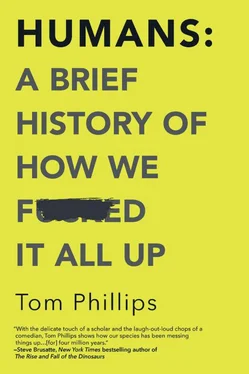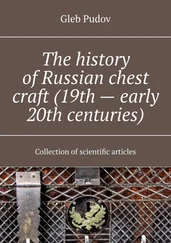Tom Phillips - Humans - A Brief History of How We F*cked It All Up
Здесь есть возможность читать онлайн «Tom Phillips - Humans - A Brief History of How We F*cked It All Up» весь текст электронной книги совершенно бесплатно (целиком полную версию без сокращений). В некоторых случаях можно слушать аудио, скачать через торрент в формате fb2 и присутствует краткое содержание. Город: Toronto, Год выпуска: 2019, ISBN: 2019, Издательство: Hanover Square Press, Жанр: История, Юмористические книги, на английском языке. Описание произведения, (предисловие) а так же отзывы посетителей доступны на портале библиотеки ЛибКат.
- Название:Humans: A Brief History of How We F*cked It All Up
- Автор:
- Издательство:Hanover Square Press
- Жанр:
- Год:2019
- Город:Toronto
- ISBN:978-1-48805-113-5
- Рейтинг книги:4 / 5. Голосов: 1
-
Избранное:Добавить в избранное
- Отзывы:
-
Ваша оценка:
- 80
- 1
- 2
- 3
- 4
- 5
Humans: A Brief History of How We F*cked It All Up: краткое содержание, описание и аннотация
Предлагаем к чтению аннотацию, описание, краткое содержание или предисловие (зависит от того, что написал сам автор книги «Humans: A Brief History of How We F*cked It All Up»). Если вы не нашли необходимую информацию о книге — напишите в комментариях, мы постараемся отыскать её.
Humans: A Brief History of How We F*cked It All Up — читать онлайн бесплатно полную книгу (весь текст) целиком
Ниже представлен текст книги, разбитый по страницам. Система сохранения места последней прочитанной страницы, позволяет с удобством читать онлайн бесплатно книгу «Humans: A Brief History of How We F*cked It All Up», без необходимости каждый раз заново искать на чём Вы остановились. Поставьте закладку, и сможете в любой момент перейти на страницу, на которой закончили чтение.
Интервал:
Закладка:
Given that two of them were brothers and the other was their uncle, it’s hard not to suspect that something hereditary might have been going on there. But equally, there’s also an overwhelming sense of “well, what did you expect ?” If you were actually trying to set up a system designed to produce somewhat unstable rulers, it’s hard to see how you could have done better than this.
The Topkapı Palace in Istanbul was not an especially safe place to be during this period, particularly if you were the son of the current sultan. The problem was your brothers—or at least, they were the problem as soon as the current sultan died and all of you tried to claim the throne at the same time.
As tended to happen with monarchies at the time, extremely bloody fights over the succession had effectively become a tradition in the previous centuries—a tradition that had an inconvenient habit of spilling over into prolonged civil war. This wasn’t terribly convenient for anybody, especially when you had an empire to expand, so sons of the sultan usually decided it was more efficient to forestall any sibling rivalry by… well, by having all their brothers murdered.
The downside of this institutional fratricide was that the Ottoman dynasty was permanently vulnerable to coming to an abrupt end, if a sultan were to die without having any sons to take over and with no brothers left unmurdered. There was also the slight issue of Sultan Mehmed III, who had no fewer than 19 younger brothers murdered when he acceded to the throne in 1595, which everybody seems to have agreed was a bit much. So, starting with Mehmed III’s successor, Ahmed I, a compromise was put in place: Kafes, which literally means “the Cage” and was a place to keep your spare brothers.
The Cage was not, in fact, a cage—it was a relatively luxurious, tastefully decorated tower just next to the harem—but it certainly had a few features in common with a cage. Like, for example, not being able to leave it.
When Ahmed I became sultan in 1603, he unexpectedly broke with the brother-murdering tradition and allowed his younger brother Mustafa to live. The fact that Ahmed was just 13 years old and Mustafa was 12 at the time might have played a part in this decision—Ahmed wouldn’t even father a son until the following year. And partly it might have been due to him feeling sympathy with Mustafa, who seems to have already been quite fragile. Basically, there seems to be a possibility that Ahmed might have been… almost nice?
So anyway, rather than being killed, Mustafa was sent off to live in the Cage, while Ahmed I got on with being sultan. This all went swimmingly until 1617, when Ahmed died of typhus.
By this point, he had fathered a bunch of sons, who technically should have inherited the throne. But due to a combination of the fact that they were also pretty young, and various bits of palace intrigue (largely down to Ahmed’s favorite consort, Kösem, not wanting her sons to be murdered when their older half brother came to power), the powers behind the throne decided to change the line of succession. Rather than going to Ahmed’s eldest son, Osman, it would pass brother-to-brother. And so it was that Mustafa became Mustafa I.
It’s fair to say that this did not go well.
Mustafa was really not cut out to be sultan. He doesn’t seem to have been terribly keen on the idea, and the whole situation hadn’t been helped by having spent the first 12 years of his life convinced that his brother was going to murder him, and then the next 14 years imprisoned with nothing to do but take opium and hang out with concubines. The powerful court eunuchs had hoped that being reintroduced into society might focus his mind a bit. Nope.
Mustafa’s main approach to governing seems to have involved giggling an awful lot, pulling the beards of his viziers and knocking their turbans off while they tried to tell him important government things. He had a tendency to appoint random people—like a farmer he met while out hunting—to powerful official positions. He was also noted for being accompanied around the palace by two virtually naked slave women, and for his habit of trying to feed gold and silver coins to fish.
The whole thing lasted about three months before everybody had absolutely had enough, and Mustafa I was overthrown by the 14-year-old Osman. Somehow, for a second time, he managed to avoid being murdered, and instead got sent back to the Cage.
That would have been that, except for the fact that the precocious Osman II was an ambitious, unorthodox sultan with a zeal for reform, who refused to be bound by tradition. (Well, mostly. He did manage to squeeze in murdering at least one of his brothers during his reign, for old times’ sake.) Osman made the crucial mistake of really annoying the elite units of the Ottoman army, the Janissaries—blaming them for a failure to win a battle he’d led, punishing them by closing their coffee shops and banning them from smoking or drinking, before finally planning to disband them altogether and raise an alternative army in Syria.
While Osman might have genuinely had a point about their military effectiveness, the Janissaries were, unsurprisingly, not entirely on board with this plan. So Osman II was given the distinction of becoming the first example of regicide in Ottoman history, killed by his own army through the inventive combination of strangulation and “compression of the testicles.”
And then, in the absence of anybody else to take over, once again Mustafa was coming out of his Cage. And he was doing… not fine.
It’s not clear if everybody thought that four more years’ confinement might somehow have improved his mental state, but if so, they were quickly disappointed, as straight away Mustafa was extremely back on his bullshit. For starters, when they came to get him out of the Cage and told him he was sultan again, he barricaded himself inside and refused to come out, explaining (not unreasonably), “I do not want to be the sultan.” After they managed to winch him out through a hole in the roof, he spent large amounts of his time running through the palace desperately looking for Osman II, who he believed was still alive and might be hiding in a cupboard. If he could find Osman, his reasoning went, he could take over being sultan again and Mustafa wouldn’t have to do it anymore.
This all went on for another 17 months (during which period Mustafa did at least find time to put a donkey driver he’d met in charge of a major mosque) before everybody decided that enough was enough. Even Mustafa’s mother signed up to the idea of deposing him for a second time, with the proviso that she would prefer it if they could see their way to not murdering him. Remarkably, everybody agreed, and Mustafa was sent off to live out his days in the Cage, having somehow managed to be sultan two times and murdered zero times.
The new sultan, Murad IV, had two major benefits for the power players in the Ottoman court: (a) he was not obviously mad, and (b) he was an 11-year-old child. His mother, Kösem, who was a remarkably skilled power player herself, got a good few years of ruling on behalf of a puppet sultan out of this arrangement. That was before Murad IV grew old enough to reveal that, if not actually mentally unsound, he was at least an utter, utter bastard.
Inheriting an empire that was in something of a state, he made up his mind to assert his authority. Hard. Deciding that his half brother Osman hadn’t gone far enough with banning stuff just for the army, Murad banned smoking, drinking and especially coffee for everybody in the Ottoman Empire.
In a list of “moves designed to piss lots of people off,” banning coffee in Turkey probably ranks somewhere alongside banning cheese in France, banning guns in America and… well, banning national stereotyping in Britain. But Murad was determined. He hated coffee drinkers so much that he would patrol the streets at night dressed in civilian clothes, looking for people drinking coffee and then executing them on the spot.
Читать дальшеИнтервал:
Закладка:
Похожие книги на «Humans: A Brief History of How We F*cked It All Up»
Представляем Вашему вниманию похожие книги на «Humans: A Brief History of How We F*cked It All Up» списком для выбора. Мы отобрали схожую по названию и смыслу литературу в надежде предоставить читателям больше вариантов отыскать новые, интересные, ещё непрочитанные произведения.
Обсуждение, отзывы о книге «Humans: A Brief History of How We F*cked It All Up» и просто собственные мнения читателей. Оставьте ваши комментарии, напишите, что Вы думаете о произведении, его смысле или главных героях. Укажите что конкретно понравилось, а что нет, и почему Вы так считаете.












